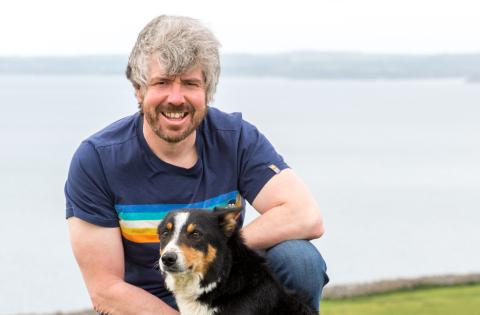Dan is a tenant farmer at Parc Farm, a National Trust Farm of 150 acres extending to 900 acres of grazing rights on the Great Orme. Dan farms this unique headland, home to rare flora and fauna, in a nature-first way.
Growing up on a family farm on Anglesey, Dan graduated in agriculture and animal science before working as a sheep research technician. He went on to secure his own farm tenancy during which time he worked as a shepherd on Snowdon for a conservation grazing project, and where he found his passion.
“It’s essential that farming, conservation and carbon sequestration work together. Reducing the amount of carbon dioxide in the air is vital in the battle against climate change.”
EXECUTIVE SUMMARY
Overseas study helps inform Welsh sheep farmer’s conservation grazing
A tenant farmer is adopting strategies he learned from conversation graziers in France and Latvia to protect and encourage populations of the foraging chough on the Great Orme.
Dan Jones, a National Trust tenant at Parc Farm on the Great Orme, visited two major farming conservation projects in those countries after being awarded a place on the Farming Connect Management Exchange programme.
Project GrassLife in Latvia and the Crau Nature Reserve in southern France use grazing techniques to protect and enhance wildlife and sequester carbon.
Mobile herds of mostly cattle are moved around the 1,300 hectares (ha) at Project Grasslife while wooded wildflower meadows have been restored to sequester carbon.
“Very practical and simple methods are used to increase carbon sequestration,’’ Dan observed.
A key role too is to increase public awareness of how farming can enhance nature.
“That is something in Wales that farmers are quite poor at doing,’’ Dan believes.
But, with thousands of visitors every year to the Great Orme at Llandudno, he says he has a good opportunity to share his experiences of farming alongside nature with the general public.
At the 7,400ha Crau Nature Reserve, traditional sheep grazing has been used to manage the land for hundreds of years and this is protecting populations of endemic birds.
“Without those sheep there would be no birds,’’ says Dan.
As a result of what he learned during his study, he aims to create wildflower meadows at Parc Farm this autumn.
He also plans to have discussions with the RSPB about how bird populations can be increased, not only of the foraging chough but other species too.
“We need to make sure that we care for all the birds, not just one species,’’ says Dan.
He noted that farmers in both Latvia and France were well supported to farm in harmony with nature.
“Farmers in those countries have quite a lot of support and education to maintain the natural environment they have.’’
MANAGEMENT EXCHANGE REPORT

